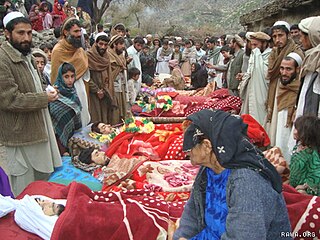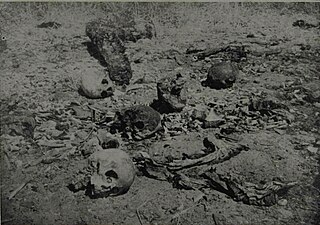
Spin Boldak is a border town and the headquarters of Spin Boldak District in the southern Kandahar province of Afghanistan, next to the border with Pakistan. It is linked by a highway with the city of Kandahar to the north, and with Chaman and Quetta in Pakistan to the south. Spin Boldak has the second major port of entry between Afghanistan and Pakistan, the Wesh-Chaman border crossing. It is also a major transporting, shipping and receiving site between the two neighboring countries.

The Taliban insurgency began after the group's fall from power during the 2001 War in Afghanistan. The Taliban forces fought against the Afghan government, led by President Hamid Karzai, and later by President Ashraf Ghani, and against a US-led coalition of forces that has included all members of NATO; the 2021 Taliban offensive resulted in the collapse of the government of Ashraf Ghani. The private sector in Pakistan extends financial aid to the Taliban, contributing to their financial sustenance.

The following items form a partial timeline of the War in Afghanistan. For events prior to October 7, 2001, see 2001 in Afghanistan.

The War in Afghanistan was an armed conflict from 2001 to 2021. It was the direct response to the September 11 attacks. It began when an international military coalition led by the United States launched an invasion of Afghanistan, declaring Operation Enduring Freedom as part of the earlier-declared war on terror; toppling the Taliban-ruled Islamic Emirate and establishing the Islamic Republic three years later. The Taliban and its allies were expelled from major population centers by the US-led forces, supporting the anti-Taliban Northern Alliance; however Bin Laden relocated to neighboring Pakistan. The conflict officially ended with the 2021 Taliban offensive, which overthrew the Islamic Republic, and re-established the Islamic Emirate. It was the longest war in the military history of the United States, surpassing the length of the Vietnam War (1955–1975) by approximately 6 months.
Abdullah Laghmani was Deputy Chief of the National Directorate of Security (NDS) in Afghanistan, and a prominent ally of President Hamid Karzai. He first served as an intelligence officer for the Northern Alliance during Taliban rule. After the formation of Karzai administration in late 2001, Laghmani served as the intelligence chief of Kandahar province before moving up as deputy chief. Laghmani was killed in a Taliban suicide bomb attack in Mehtar Lam, Laghman Province.
Events from the year 2009 in Afghanistan
The February 2010 Kabul attack on 26 February 2010 was a combined suicide bombing and shooting attack. A car bomb levelled the Arya Guesthouse, also known as the Hamid Guesthouse, popular with Indian doctors. Two armed attackers then entered the nearby Park Residence, housing other foreigners. One detonated a suicide bomb, and the other was shot dead. The Safi Landmark Hotel nearby was badly damaged by the blasts. At least 18 people were killed and 36 more were injured.

The night raid onNarang was a night raid on a household in the village of Ghazi Khan in the early morning hours of December 27, 2009. The operation was authorized by NATO and resulted in the death of ten Afghan civilians, most of whom were students, and some of whom were children. The status of the deceased was initially in dispute with NATO officials claiming the dead were Taliban members found with weapons and bomb making materials, while some Afghan government officials and local tribal authorities asserted they were civilians.
There used to be a small community of Indians in Afghanistan who are Afghans of Indian origin as well as Indian construction and aid workers involved in rebuilding and humanitarian assistance efforts. India is often described as acting as a soft power in Afghanistan. Having committed a $2.3 billion aid programme, India is one of the largest donors to Afghanistan, investing in the economy, humanitarian aid, education, development, construction and electrical. According to Foreign Policy among Afghans there is a positive perception of India's role in the reconstruction efforts in Afghanistan.
The following lists events from 2014 in Afghanistan.
The following lists events that happened during 2015 in Afghanistan.
The 2015 Kabul Parliament attack occurred on June 22, 2015, when members of the Taliban detonated a car bomb outside the National Assembly in Kabul then attacked the building with assault rifles and RPGs. Two civilians and seven Taliban died in the attack.
The following lists events that happened during 2016 in Afghanistan.
Events in the year 2017 in Afghanistan.
Events in the year 2018 in Afghanistan.
Events from the year 2019 in Afghanistan.
On 21 January 2019, in central Afghanistan, the Taliban attacked a military compound in Maidan Shar, killing officers of the Afghan National Directorate of Security. The Taliban attacked while engaging in the process of negotiating a truce with the United States. The attack began when an explosives-laden car rammed through a military checkpoint and onto the grounds of the compound, where the vehicle detonated. After the explosion, two gunmen entered the base and opened fire on Afghan soldiers, before the two were shot down. A senior official in the Afghan defense ministry said that 126 people were killed in the explosion. The Taliban claimed responsibility and stated that over 190 people were killed in the attack. The Afghan National Directorate of Security (NDS) reported that 36 military personnel were killed in the attack. Afghan president, Ashraf Ghani condemned the attack and said that the 'Afghan intelligence agency personnel were target of the attack'.
This article summarizes the history of the War in Afghanistan (2001–2021).
Events in the year 2020 in Afghanistan.

On 25 March 2020, ISIS-Haqqani network gunmen and suicide bombers attacked the Gurdwara Har Rai Sahib in Kabul, Afghanistan.





